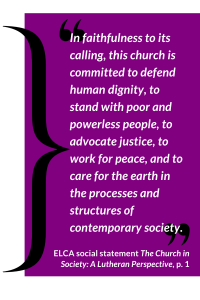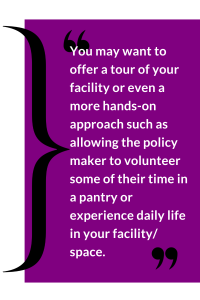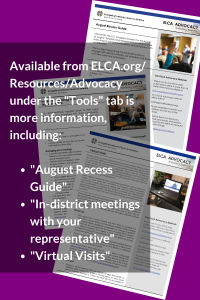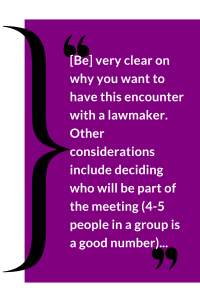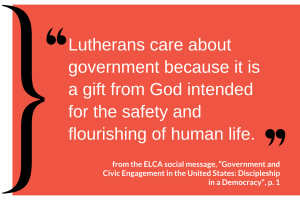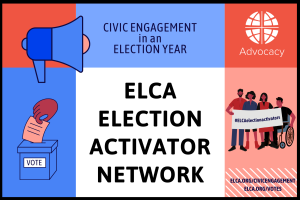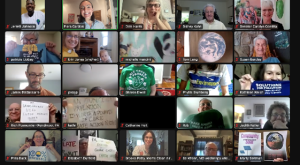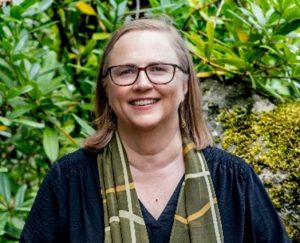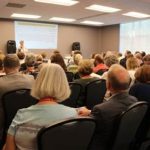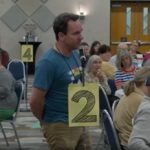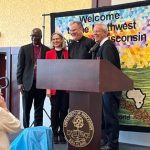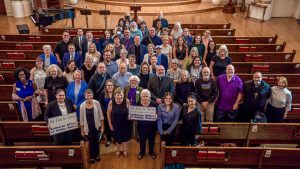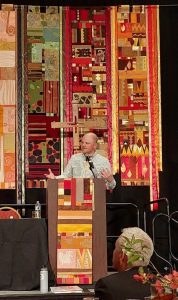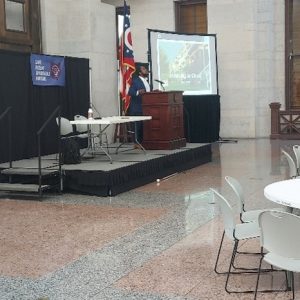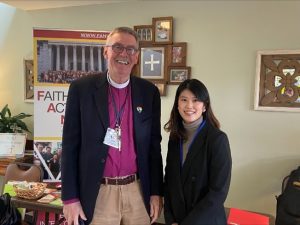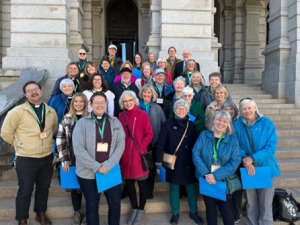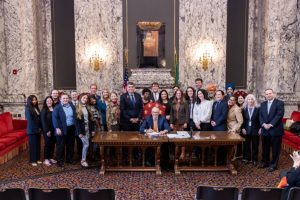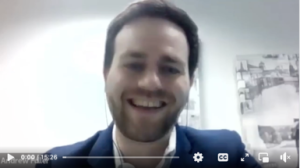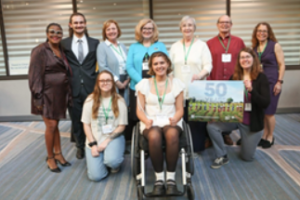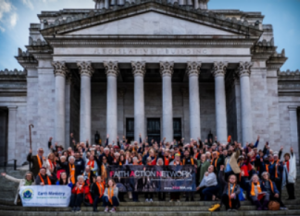Following are updates shared from submissions of the Lutheran Office for World Community and state public policy offices (sppos) in the ELCA Advocacy Network last month. Full list and map of sppos available.
U.N. | OHIO | PENNSYLVANIA| | WASHINGTON
New York
Lutheran Office for World Community (LOWC), U.N. – ELCA.org/lowc
Christine Mangale, Director
The High Level Political Forum took place from 8-17 July 2024. LOWC staff, fellows and intern monitored and engaged with meetings reviewing the implementation of the Sustainable Development Goals (SDGs). However, the SDGs are in crisis as only 15% of the goals and targets have been met within the first half of the mandate period and forecaster anticipate further reductions to impact of this platform to reduce poverty. Additionally, deep and formative tensions associated with the geopolitical and economic challenges confronting the multilateral system were a recurring theme at the July 2024 session of the HLPF. These issues inevitably spilled onto the floor of the closing plenary as delegates considered adoption of the Ministerial Declaration, resulting in votes on two contested paragraphs: one recognizing that sustainable development cannot be realized without peace and security, and a newly proposed paragraph drawing attention to the impact of unilateral coercive measures (economic sanctions) on poverty and food security, among other SDGs.
The Lutheran Church globally has invested heavily in the SDGs and their success. We see our role in this policy agenda as a stakeholder, watch dog and champion. The challenges facing this policy platform reflect challenges we are seeing within our own church constituencies and communities. These indicators are a call to united action against the rise and influence of Christian nationalism and other expressions of self-interested governance.
In September the United Nations General Assembly will meet for a Summit of the Future which will further elucidate the roots of the challenge of multilateralism today, and seek structural changes to make the UN more ‘fit for purpose’. This will (could) include an SDG stimulus and other efforts to reduce conflict and climate change to create an environment conducive to fair and just economic growth.
Ohio
Hunger Network in Ohio (HNO) – Hunger Network in Ohio (hungernetohio.com)
Deacon Nick Bates, Director
REDISTRICTING HEADS TO THE BALLOT!
Ohioans will have the opportunity this November to vote for a more equitable and fair way to draw legislative maps in Ohio. For many years, Ohioans have heard about the ‘duck shaped district’ and the ‘snake on the lake,’ but under a new proposal, an independent commission will draw legislative maps instead of legislative leaders with personal and political ambitions that shape the maps.
“Politics should be about how we solve problems as a community, and not how we can gain more power or wins for our team,” says Deacon Nick Bates, director of HNO. Right now, legislative leaders are more concerned about national political allies and interests than what is going on in their districts – such as rising hunger or a lack of affordable housing. “This sensible redistricting reform ballot measure will allow the voices of food pantries, PTAs, and other community groups to be heard above the partisan rancor of the Ohio General Assembly once again.”
Pennsylvania
Lutheran Advocacy Ministry Pennsylvania (LAMPa) – LAMPa (https://www.lutheranadvocacypa.org/)
Tracey DePasquale, Director
With the state budget finalized and the legislature in recess, LAMPa staff have been busy preparing resources for congregations to support discipleship in a democracy. From digital peacebuilding, to guidelines for advocacy and civic engagement during an election year, to skills development in conflict resolution, active listening and difficult conversations, LAMPa will be offering webinars in partnership with Search for Common Ground from now through October.
As part of work to support and protect elections through a Faith in Elections grant from Interfaith America, LAMPa is seeding ten “Love Anyway Feasts” to be held between now and the General Election. Volunteers selected in May will be hosting meals with bridge-building as the centerpiece –  with tips and conversation guides focused on helping people celebrate their differences instead of fighting over them. Hosts will lean on and learn from one another and then share their experiences with others. LAMPa is also facilitating a survey of county elections offices in order that volunteers might offer support in recruiting poll workers, identifying polling sites and ensuring trustworthy elections information.
with tips and conversation guides focused on helping people celebrate their differences instead of fighting over them. Hosts will lean on and learn from one another and then share their experiences with others. LAMPa is also facilitating a survey of county elections offices in order that volunteers might offer support in recruiting poll workers, identifying polling sites and ensuring trustworthy elections information.
LAMPa is excited to offer “Lessons from Dietrich Bonhoeffer from a House Divided and a World on Fire,” a curriculum for congregations developed by Dr. Lori Brandt Hale in partnership with the International Bonhoeffer Society. It is offered for free download as gift to the church, but a contribution in recognition of scholarship and time is appreciated.
Washington
Faith Action Network (FAN) – Home – Faith Action Network (fanwa.org)
Kristin Ang, Director
Farm Bill Advocacy
Here is the recording from the online event “Why is the Farm Bill Important to Us?” available for anyone interested in learning about the opportunities to advocate for the passing of a just and sustainable farm bill this year. We had a vibrant and informative discussion with Lutheran guest speakers from multi-sectional backgrounds, all impacted by the Farm Bill.
Voting and Civic Engagement
We have been emphasizing the importance of voting and civic engagement as an inseparable part of FAN’s advocacy through the 100% Voting Faith Community campaign. This summer, the cohort of faith communities and individuals who pledged to work toward becoming a 100% voting faith community has been meeting monthly online. In our first meeting in June, we invited Kim Bobo from Virginia Interfaith Center for Public Policy, an ELCA State Public Policy Office in Virginia. In the second meeting in July, we introduced our newly launched toolkit “Civic Engagement Toolkit for Faith Communities.” The toolkit offers a variety of ways faith communities can plan and organize voter registration and civic engagement efforts as 501(c)(3). We also heard from the cohort about the need to organize around educating the community members about the ballot initiatives and the threat of rising Christian Nationalism.
Holden Village Summer Week
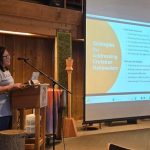
Kristin Ang, FAN Policy Engagement Director giving a workshop at Holden Village in the North Cascade Mountains
Our policy engagement director Kristin Ang was at Holden Village recently as a summer teaching faculty. Kristin taught about faith-based advocacy and how to advocate against Christian Nationalism. There was a notable engagement from the participants reflecting on ways in which we may be accommodators to this ideology and how we can faithfully respond and stand up against it.

